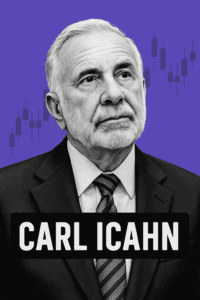
CARL ICAHN – ICAHN CAPITAL MANAGEMENT Q3 2025 PORTFOLIO
Icahn Capital Management, a hedge fund managed by Carl Icahn, disclosed 13 security holdings in its Q3 2025 13F filing, with a total portfolio value of $9,141,599,232.
Carl Icahn’s Portfolio
As of Q3 2025, Carl Icahn’s Icahn Capital Management portfolio demonstrates continued strategic evolution with a $9.14 billion portfolio across 13 holdings. The quarter showcases significant portfolio growth of 16% from Q2, driven by strategic additions in the telecommunications and automotive sectors, alongside continued accumulation of core energy and infrastructure positions.
Top Holdings
Additional Holdings
Portfolio Strategy Analysis
The portfolio grew 16% from $7.89 billion to $9.14 billion, expanding from 12 to 13 holdings. This growth reflects both strategic new positions and continued accumulation of high-conviction names, particularly in infrastructure and specialty chemicals sectors.
The addition of EchoStar at 3.64% marks a significant new bet on satellite and wireless communications. This $332 million position suggests Icahn sees value or potential catalysts in the evolving telecommunications landscape, possibly anticipating industry consolidation or strategic transactions.
Centuri Holdings saw remarkable accumulation with a 69.39% increase in just its second quarter in the portfolio. Combined with the trimming of Southwest Gas Holdings by 19.91%, this suggests a strategic rotation within utilities toward infrastructure services over regulated utilities.
International Flavors & Fragrances saw a substantial 26.67% increase, breaking from its previous unchanged status. This addition of 1 million shares signals renewed conviction in specialty chemicals, potentially viewing the current valuation as attractive for this global leader in taste, scent, and nutrition.
The complete exit from Bausch Health Companies (BHC) marks a significant portfolio change. After maintaining this position unchanged through Q2, Icahn fully divested, potentially realizing gains or moving on from the turnaround story while retaining exposure to eye health through Bausch + Lomb.
Conclusion
Carl Icahn’s Q3 2025 portfolio reveals an activist investor in growth mode, expanding his portfolio by 16% while making strategic sector bets. The addition of EchoStar and Monro, combined with aggressive accumulation of Centuri Holdings and International Flavors & Fragrances, demonstrates active capital deployment and conviction in undervalued opportunities.
The complete exit from Bausch Health while maintaining Bausch + Lomb suggests a more refined approach to healthcare investments. The significant reduction in Southwest Gas paired with aggressive Centuri accumulation indicates a strategic preference for infrastructure services over regulated utilities.
With Icahn Enterprises and CVR Energy still commanding 76% of the portfolio, Icahn maintains a concentrated approach while selectively adding new positions. The portfolio is positioned across energy, infrastructure, telecommunications, specialty chemicals, and selective consumer services—sectors where Icahn likely sees catalysts for value creation through operational improvements, industry consolidation, or activist engagement.
Icahn Capital Portfolio Analysis
Based on 13F filing for reporting period: Q3, 2025
Portfolio Manager
Carl Icahn
Filing Date
November 14, 2025
Total Value
$9,141,000,000+
Number of Positions
13
Portfolio Allocation
Holdings Breakdown
| Rank | Company Name | % of Portfolio | Q3 Activity | Ticker | Shares | Market Value ($) |
|---|




